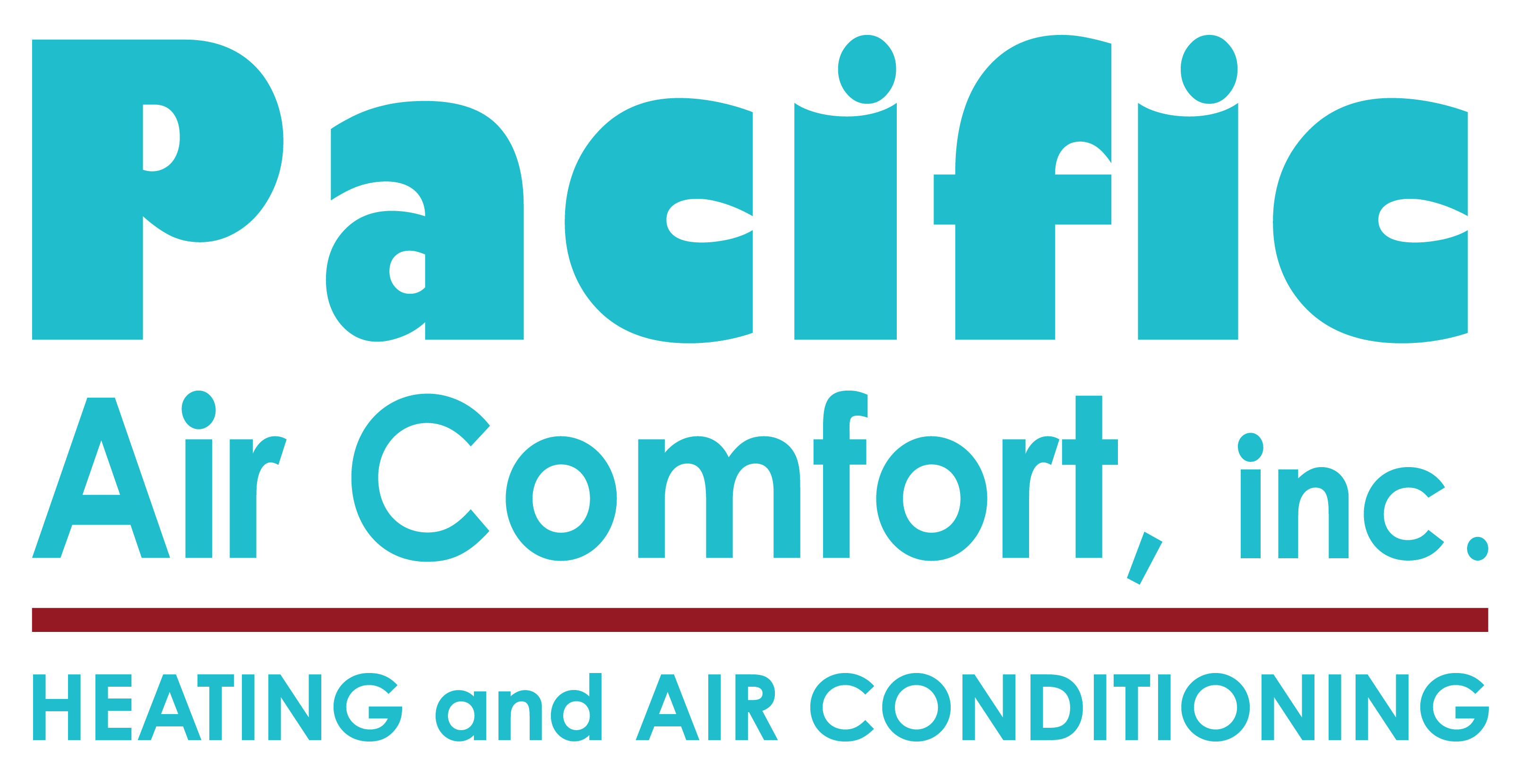Maintaining your HVAC (Heating, Ventilation, and Air Conditioning) system is important if you want a system that keeps your family or business cool and warm no matter the temperatures outside. In Roseburg OR our weather can see both extremes.
Regular maintenance not only helps in identifying potential issues before they become major problems but also ensures that your system operates at peak efficiency, saving you energy and money. Here’s a comprehensive HVAC maintenance checklist to keep your system in top shape:
1. Regular Inspections
Monthly Inspections
- Check Thermostat Settings: Ensure that your thermostat is set to the desired temperature. Change the settings according to seasonal needs. This simple step can significantly impact your energy bills and overall comfort. A properly set thermostat can prevent unnecessary strain on your HVAC system, ensuring it runs efficiently.
- Inspect Air Filters: Air filters should be checked monthly. Dirty filters should be cleaned or replaced to ensure proper airflow and efficiency. Clogged filters can cause your HVAC system to work harder, leading to higher energy consumption and potential damage over time. Keeping filters clean also enhances indoor air quality.
- Examine Outdoor Units: Ensure that the outdoor unit is free from debris, leaves, and other obstructions. Clear at least two feet around the unit. This allows for adequate airflow and prevents the unit from overheating. Regularly cleaning the area around the outdoor unit can prevent costly repairs and extend the life of your system.
Seasonal Inspections
- Inspect Electrical Components: Check for any loose connections and ensure that electrical connections are tight. Look for signs of wear or damage. Faulty electrical components can lead to system failures and pose safety hazards. Regular inspections can prevent unexpected breakdowns and ensure safe operation.
- Check Refrigerant Levels: Ensure that the refrigerant levels are within the recommended range. Low refrigerant levels can affect the efficiency and cooling capacity. If you notice a drop in cooling performance, it might be due to low refrigerant levels, which should be addressed promptly to avoid further issues.
- Inspect Ductwork: Check for any leaks, obstructions, or damage in the ductwork. Properly sealed ducts improve HVAC efficiency. Leaky ducts can lead to significant energy loss, impacting both comfort and utility bills. Regular duct inspections and maintenance can enhance overall system performance.
2. Cleaning Tasks
Bi-Annual Cleaning
- Clean Coils: Both evaporator and condenser coils can accumulate dirt over time. Dirty coils reduce the system’s efficiency and can cause it to overheat. Cleaning the coils bi-annually ensures optimal heat exchange and prevents system malfunctions.
- Clear Drains: Ensure that the condensate drain is clear of obstructions. A clogged drain can cause water damage and affect humidity levels. Regularly clearing the drains prevents water buildup and mold growth, maintaining a healthy indoor environment.
- Clean and Straighten Fins: The fins on evaporator and condenser coils can become bent or dirty. Cleaning and straightening them ensures proper airflow. Proper fin maintenance helps in efficient heat exchange, enhancing overall system performance.
Annual Deep Cleaning
- Deep Clean Blower Assembly: The blower assembly should be cleaned to remove any dust and debris that can affect airflow and efficiency. A clean blower ensures that air circulates freely throughout your home, maintaining consistent temperatures.
- Clean Heat Exchanger: For heating systems, the heat exchanger should be inspected and cleaned to remove any soot or build-up. This step is crucial for maintaining heating efficiency and preventing potential safety hazards such as carbon monoxide leaks.
- Sanitize Ductwork: An annual sanitization of the ductwork can help in reducing allergens and improving indoor air quality. Clean ducts prevent the spread of dust, mold, and other pollutants, contributing to a healthier living environment.
3. System Testing
Performance Testing
- Measure System Efficiency: Perform a system efficiency test to measure the output and compare it with the manufacturer’s specifications. This helps in identifying any performance issues early and ensures that your system is running as efficiently as possible.
- Test Thermostat Calibration: Ensure that the thermostat is accurately reading the temperature and that it is correctly calibrated. A miscalibrated thermostat can lead to incorrect temperature regulation, affecting comfort and energy consumption.
- Check System Controls: Ensure that the system starts, operates, and shuts off correctly. Inspect all controls and safety mechanisms. Proper functioning of controls is crucial for safe and efficient system operation.
Safety Testing
- Inspect Gas Lines: For systems using gas, inspect the gas lines for leaks, wear, and proper connection. Gas leaks can be dangerous and need to be addressed immediately to ensure safety.
- Test Carbon Monoxide Levels: Ensure that carbon monoxide detectors are functioning and test the levels around the HVAC system. Carbon monoxide is a silent killer, and having functional detectors is essential for your family’s safety.
- Check for Proper Venting: Ensure that all venting systems are clear and that exhaust gases are properly vented out of the building. Proper venting prevents the buildup of harmful gases indoors, maintaining a safe environment.
4. Routine Maintenance
Regular Replacement
- Replace Air Filters: Depending on the type of filter, it should be replaced every 1-3 months. Regular replacement ensures optimal airflow and system efficiency, reducing energy consumption.
- Change Thermostat Batteries: If your thermostat uses batteries, replace them annually to ensure uninterrupted operation. This simple step can prevent unexpected system shutdowns and maintain consistent temperature control.
- Replace Worn Belts and Pulleys: Inspect belts and pulleys for wear and tear, and replace them as needed. Worn components can lead to system inefficiencies and potential breakdowns, making regular inspections crucial.
Professional Maintenance
- Schedule Professional Inspections: Hire a professional HVAC technician like Pacific Air Comfort for a detailed inspection and tune-up at least twice a year. Professional maintenance can identify and address issues that may not be apparent during routine checks.
- Update System Components: Stay updated with the latest upgrades and components that can enhance system efficiency and performance. Technological advancements can provide significant improvements in energy efficiency and system reliability.
- Review Warranty Requirements: Ensure that all maintenance is in line with the manufacturer’s warranty requirements to avoid voiding the warranty. Adhering to warranty guidelines ensures that you are covered in case of major system failures.
5. Preventative Tips
Energy Efficiency
- Install a Programmable Thermostat: A programmable thermostat can help in saving energy by adjusting the temperature according to your schedule. This can lead to significant energy savings without compromising comfort.
- Seal and Insulate: Properly seal and insulate your home to reduce the load on the HVAC system and improve energy efficiency. This step helps in maintaining consistent indoor temperatures and reduces energy consumption.
- Use Ceiling Fans: Ceiling fans can help in circulating air and reducing the reliance on the HVAC system. They can enhance comfort while allowing you to set your thermostat at a more energy-efficient temperature.
System Longevity
- Keep Vents Open: Ensure that all vents are open and unobstructed to maintain proper airflow and reduce strain on the system. Blocked vents can cause the system to work harder, leading to increased wear and tear.
- Regularly Check System Performance: Keep an eye on the system’s performance and address any unusual noises or issues promptly. Early detection of problems can prevent major repairs and extend the life of your HVAC system.
- Maintain an Annual Maintenance Log: Keep a detailed log of all maintenance activities to track system performance and anticipate future needs. This log can be invaluable for scheduling timely maintenance and identifying recurring issues.
Professional Advice
- Consult with Pacific Air Comfort: Regularly consult with an HVAC specialists like Pacific Air Comfort to get professional advice tailored to your system and needs. Expert guidance can help in optimizing system performance and addressing specific concerns.
- Stay Informed: Keep yourself informed about the latest HVAC technologies and maintenance practices. Staying updated can help you make informed decisions about system upgrades and maintenance strategies.
HVAC Maintenance Checklist FAQ
1. How often should I inspect my HVAC system?
Monthly Inspections: Check thermostat settings, inspect air filters, and examine outdoor units.
Seasonal Inspections: Inspect electrical components, check refrigerant levels, and inspect ductwork.
2. What cleaning tasks should be performed for optimal HVAC performance?
Bi-Annual Cleaning: Clean coils, clear drains, and clean and straighten fins.
Annual Deep Cleaning: Deep clean blower assembly, clean heat exchanger, and sanitize ductwork.
3. How can I test my HVAC system’s performance and safety?
Performance Testing: Measure system efficiency, test thermostat calibration, and check system controls.
Safety Testing: Inspect gas lines, test carbon monoxide levels, and check for proper venting.
4. What routine maintenance tasks are essential for HVAC longevity?
Regular Replacement: Replace air filters every 1-3 months, change thermostat batteries annually, and replace worn belts and pulleys.
Professional Maintenance: Schedule professional inspections twice a year, update system components, and review warranty requirements.

